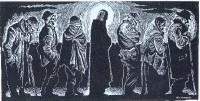

Karen House Catholic Worker
 |
Karen House Catholic Worker |
The RoundTable Recovering the Spirit of Healing Summer 1990
Major Articles
|
Download Entire Issue by Clicking Image Above (large file - it takes a minute!) |
|||
Karen House: 1840 Hogan St. Saint Louis, MO 63106 Contact Us: 314.621.4052 |
Regular Features
|
Why This Issue: North Americans worship the body. We make detailed studies of the best foods to put into it (only oat bran twinkies from now on) which change periodically to keep us guessing (no-skip the oat bran, any old fibre will do). We smear lotions, scents and colors on the outside according to the season. We jog, swim, hike, bike, walk or lift weights for the benefit of both the inside and the outside. We fry our eggs in canola oil and drink bottled water. The icons of our worship are spread throughout our visual space. Billboards, magazines, TV commercials all present the object of our devotions: tousle-haired women lounging on beaches, grave, open-shirted men riding horses.
But we worship the body in a severely restricted sense. We only offer tribute to the healthy body; unscarred, unbroken, whole. What becomes of those who do not fit this mold: the old, the sick and the dying?
To be sick or infirm is counter to the North American ideal, hence our health care system is oriented towards the fulfillment of one of two goals: complete health, or death. We pursue death, in the form of inadequate treatment for the uninsured, the poor, and for those with chronic mental illnesses; death in the form of abortion for the unborn who will not be physically or mentally whole; death in the form of euthanasia for the terminally ill We pursue health for those who have the money to pay for it. How can we care for the health of our health care system?
John Kavanaugh, SJ, in his article about the relationship between Capitalism and health, points out the contradictions in our narrow focus upon healing the body to the utter neglect of those political and economic aspects of our culture which destroy the spirit. Vince Estrada, drawing on his experience as a social worker to the homeless, reminds us that medical care should treat not simply the body but the person. Caring for the person who is ill or frail is a work of mercy which, Barb Prosser reveals to us, can enrich our lives and teach us much. Both Barb and Jan Livingston care for people who will not get well or be cured; Jan writes of her work in a hospice encountering "the adventure that death is."
We include our house articles, a reflection from Bill Miller, and a contribution "From Central America" by Dave Schenck who is working in the unhealthy atmosphere of Guatemala. All of these articles share a common theme: that it is not the body which is sacred but the embodied person. For richer or poorer, in sickness and in health, ‘til death do we part, we are, as Christians and believers, committed to the well-being of persons. This means that we must struggle against a health care system which focuses narrowly on bodily health, and only for those who have the money, in order to profit from our national obsession.
- Ellen Rehg |
The RoundTable is 24 pages long. To download, you'll need the most recent version of Adobe Acrobat. Download Adobe Acrobat 8 here (it's easy AND free!)
Search all of the RoundTable issues for an author, subject or title here: |